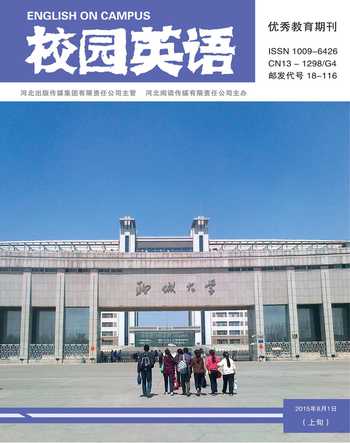AComparisonofDifferentVersionsoftheTranslationofPrideandPrejudice
TaoRan
Pride and Prejudice is the master piece of Jane Austen.This work takes the daily life as the source material,different from the popular sentimentalism writing at that time,and gives a vivid reflection of the conservative life under the unenlightened condition in Britain in the 18th to 19th century.Jane was very good at portraying the bright character images during daily ordinary things.No matter Elizabeth or Mr.Darcy who were affirmative by the author or Wickham and Mr.Collins who encountered the satire,Jane made them really moving.She tried to be humorous in dialog art,and always contrasted the characters disposition by humorous languages,which enabled her work to have her own characteristic.The British famous artist and critic T.T.Kebble named Jane Austen as a comedy artist and considered her as the second Shakespeare in pure comedies.Maugham once gave the critics of Pride and Prejudice like this:“ The reasons for a work to became the classical famous work,was not the critics praise,professors elaboration research or serving as the textbook in school,but because one generation and another generation of numerous readers joyfulness and inspiration obtained from the book.Pride and Prejudice,generally speaking,was the most satisfying work in all novels.” At present,there are mainly six versions of Chinese translation for reading,in which Wang Keyis version and Sun Zhilis version are praised highly.Now,we select the first two paragraphs to make a comparative analysis.
1.It is a truth universally acknowledged that a single man in possession of a good fortune must be in want of a wife.
Tr.1: 凡是有钱的单身汉,必定要娶位太太,这已经成了举世公认的真理。(Wang Keyi)
Tr.2: 一个富有的单身汉所缺少的一定是一位年轻貌美的太太,这已是一条举世公认的真理。(Wang Jinhua)
Tr.3: 饶有家资的单身男子必定想要娶妻室,这是举世公认的真情实理。(Zhang Ling,Zhang Yang)
Tr.4: 有钱的单身汉总要娶位太太,这是一条举世公认的真理。(Sun Zhili)
Tr.5: 举世公认,一个拥有一大笔财产的单身男人,必定想娶一个女人做太太,这已成为一条真理。(Yi Hai)
Tr.6: 公认有这样一个真理:一个拥有大笔家产的单身汉必然需要一个妻子。(Wang Zuoliang)
This is the most popular sentence in the whole English novel.The source text is full of irony revealed from the two aspects.Firstly,the author used a lot of formal words and expressions,such as “truth universally acknowledged”,“in possession of”,“be in want of” to express,however,a mundane idea.Secondly,the main clause “It is a truth universally acknowledged” seems to be like an objective law universally applied.Nevertheless,in the subordinate clause,the intonation suddenly turns down and becomes undramatic which forms of an obvious contrast with the main clause,and so established the humorous ironic tone of the novel.In all those versions,the translators all emphasized the satire of “举世公认的真理”,while,the 3rd,4th and 6th ones are a little bit flat,although it maybe expressed simply and clearly.Further more,the word “凡是” in the 1st version is to some degree the best in increasing the ironic tone of the original text.In the 2nd version,the author plus a sense of “年轻貌美” to the word “wife” which does not exist in the original text.So from the ironic aspect the 1st and 5th versions are slightly better,while,the 1st one is more concise and comprehensive.
Another difference of the six versions of translation lies in how to translate the word “wife”.The 1st,2nd,4th and 5th versions all translated it into “太太”,while the 3rd and 6th versions take it as “妻子” or more formally “妻室”.The word “妻子” is related to the traditional Chinese culture,and more from the aspect of male power.However,the word “太太” is more modern and fashion and whats more,it reveals of the social status and respect of the wife of a man in possession of a good fortune in the 19th century.
2.However little known the feelings or views of such a man may be on his first entering a neighborhood,this truth is so well fixed in the minds of surrounding families,that he is considered as rightful of some one or other of their daughters.
Tr.1: 这样的单身汉,每逢新搬到一个地方,四邻八舍虽然完全不了解他的性情如何,见解如何,可是,既然这样的一条真理早已在人们心目中根深蒂固,因此人们总是把他看作是自己某个女儿理所应得的一笔财产。(Wang Keyi )
Tr.2: 不管这样一个单身汉的感情或者看法如何地鲜为他的邻居所知,这条真理在周围住户们的脑子里却是根深蒂固的,乃至总有这个或者那个邻居把他看作了他们某个女儿的理所应得的财产。(Wang Jinhua)
Tr.3: 正是因为这个真情实理家喻户晓深入人心,这种人一般到什么地方,尽管他的感觉见解如何街坊四邻毫不了解,他就被人当成了自己的这个或者那个女儿的一笔应得的财产。(Zhang Ling,Zhang Yang )
Tr.4: 这条真理还真够深入人心的,每逢这样的单身汉新搬到一个地方,四邻八舍尽管对他的性情见识一无所知,却把他视为自己某一个女儿的合法财产。(Sun Zhili)
Tr.5: 当这样一个单身男人初到一个地方住下来,他的左邻右舍还不了解他的性情如何观念怎样的时候,他们就会把他看做某个女儿的一笔正当的财产,因为以上那句至理名言已深深铭刻在他们的内心。(Yi Hai)
Tr.6: 不论这样一个人在进入本区之初,其感情和见解如何难知,附近的人家已经深信上述真理,总把他当作他们之中某个女儿的合法财产看待。(Wang Zuoliang)
All the six versions are influenced by the rule of faithful,so they maybe not so clear and coherent when reading.When translating the word “neighborhood”,the 1st and 4th versions take it as “四邻八舍”,the 3rd and 5th one take it as “街坊四邻” or “左邻右舍” which have a similar meaning in Chinese,the 6th one take it as “附近的人家” and the 2nd just take it simply as “邻居”.To review the original text in Chapter 8,it is easily to find out that when Jane got sick in Netherfield Park,Elizabeth walked for about three or four miles to see her which concludes that Netherfield Park is not so close to the Bennets,so the version of “四邻八舍” may be more proper.
There is also a truth that Pride and Prejudice is a master piece of feminism culture,which,in this paragraph can be easily concluded by using of the passive voice “he is considered… ” .All of the six versions are translated by using passive voice in the approach of “把” sentence pattern or “被” sentence pattern in Chinese,but there is also a little bit difference.Except the 3rd version,all the other ones take the “把” sentence pattern which means that they emphasized more of the neighbors actions and weakening the mans receiving of it.However,the 3rd one emphasized more of the mans situation.From this aspect,the other five versions are better in expressing the feminism of the source text in translation.
References:
[1]Austen J.Pride and Prejudice.Oxford:Oxford University Press,1970.
[2]简·奥斯丁.傲慢与偏见[M].张玲,张扬,译.北京:人民文学出版社,1993.
[3]简·奥斯丁.傲慢与偏见[M].孙致礼,译.南京:南京译林出版社,2000.
[4]简·奥斯丁.傲慢与偏见[M].王科一,译.上海:上海译文出版社,2002.
[5]简·奥斯丁.傲慢与偏见[M].王晋华,译.北岳文艺出版社,2003.
作者简介:
陶然,女,1987年10月出生,安徽铜陵人,硕士研究生,助教,研究方向:英语教学和翻译理论与实践。

